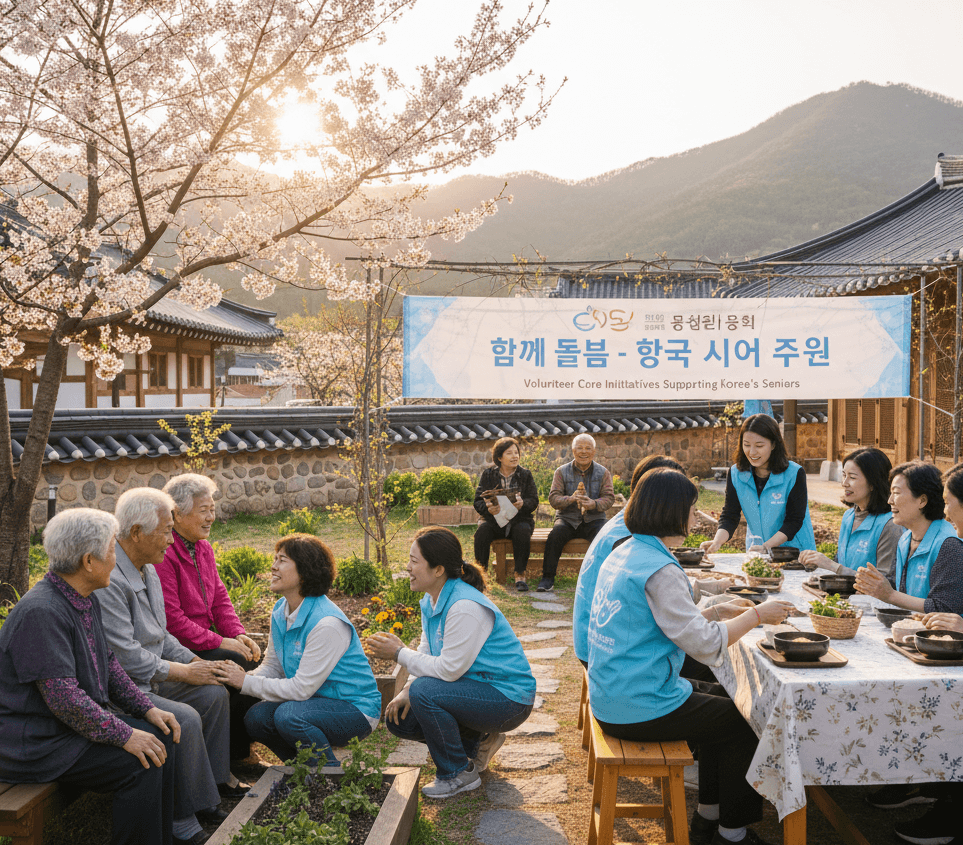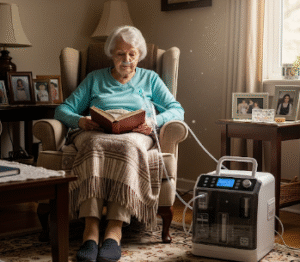As South Korea’s population continues to age rapidly, the country is seeing a remarkable rise in volunteer-driven care initiatives that support the health, happiness, and dignity of older adults. With fewer young family members available to provide daily help, community-based volunteer networks have become an essential part of the nation’s elder care system. These initiatives, supported by government agencies, NGOs, and local citizens, are helping seniors stay connected, cared for, and valued within their communities.
The Growing Importance of Volunteer Care
Korea’s aging society faces significant challenges — including rising healthcare needs, loneliness, and the growing number of elderly people living alone.
● Demographic Reality: More than 20% of South Koreans will be aged 65 or older by 2026, making Korea one of the fastest-aging nations globally.
● Living Alone: Approximately 1 in 4 seniors now live by themselves, increasing the risk of isolation and mental health issues.
● Community Response: Recognizing these challenges, volunteers have stepped in to fill emotional and social gaps, providing not just physical assistance but also companionship and connection.
These volunteer initiatives represent a shift from purely institutional care to community-based, human-centered elder support — ensuring that older adults remain active and engaged members of society.
Government-Supported Volunteer Programs
The Korean government has introduced a range of programs to encourage civic participation in elder care.
● Senior Care Service (노인돌봄서비스): Run by the Ministry of Health and Welfare, this program organizes volunteers and part-time caregivers to provide home visits, meal delivery, cleaning, and companionship for seniors living alone.
● Local Volunteer Centers (자원봉사센터): Nearly every city and district in Korea has a community volunteer center that recruits and trains residents to assist older adults with daily tasks, shopping, and conversation visits.
● Public Health Support Volunteers: Health-related volunteers, including nurses and university students, work alongside local health centers to provide basic medical checks such as blood pressure or glucose monitoring for elderly residents.
● Digital Literacy Volunteers: The government’s “Smart Senior” campaign mobilizes youth volunteers to teach seniors how to use smartphones, messaging apps, and digital healthcare platforms.
These structured programs ensure that volunteerism is well-organized, sustainable, and responsive to the needs of aging citizens.
University and Youth Volunteer Programs
Korean universities play an active role in cultivating compassion among students through volunteer outreach programs for seniors.
● Student-Led Home Visit Programs: University clubs regularly visit senior homes or community centers to offer help with cleaning, grocery shopping, and companionship.
● Cultural Exchange Activities: Students organize music performances, art therapy, and storytelling sessions, creating joyful intergenerational connections.
● Health Promotion Projects: Nursing and medical students conduct free health screenings and teach seniors about exercise and nutrition.
● Digital Assistance Teams: Young volunteers help older adults access telemedicine platforms, online banking, and social media — bridging the generation gap through technology.
These initiatives not only enrich the lives of seniors but also teach young people the value of empathy, service, and community responsibility.
NGO and Religious Organization Contributions
Non-governmental and faith-based organizations have long been pillars of community care for Korea’s seniors.
● Korea Senior Citizens Association (대한노인회): Operates community centers where volunteers provide education, leisure activities, and peer support programs.
● Community Welfare Foundations: NGOs like the Beautiful Foundation (아름다운재단) sponsor meal delivery, health checkups, and emotional support programs for low-income elderly residents.
● Religious Organizations: Churches, temples, and Buddhist organizations regularly organize “Warm Lunch” initiatives, winter clothing drives, and home repair projects for vulnerable seniors.
● Corporate Volunteer Programs: Many Korean companies include volunteerism in their CSR (Corporate Social Responsibility) efforts — sending employees to assist in elderly homes, deliver meals, or provide free medical supplies.
Together, these networks strengthen the social fabric of care and compassion throughout the country.
Community-Based Volunteer Models
In recent years, Korean communities have developed creative ways to integrate volunteerism into local life.
● Neighborhood Watch Volunteers (이웃지킴이): Residents volunteer to check in regularly on elderly neighbors, ensuring their safety and well-being.
● Time Bank Programs: Volunteers earn credits for helping seniors, which they can later use to receive help themselves when they get older.
● Senior-to-Senior Volunteering: Retired seniors volunteer to help their peers through companionship calls, group activities, and counseling — showing that age itself can be a source of support.
● Community Care Houses (커뮤니티케어하우스): Shared living facilities encourage younger volunteers and seniors to live and interact together, promoting inclusion and mutual understanding.
These grassroots models demonstrate how everyday citizens can contribute to a culture of care that transcends age barriers.
Volunteer Training and Support
To maintain quality and reliability, Korea places great emphasis on volunteer training and certification.
● Skill-Based Training: Volunteers learn basic caregiving skills, mental health awareness, and emergency response.
● Communication Workshops: Programs teach how to talk empathetically with seniors experiencing loneliness or cognitive decline.
● Safety and Ethics Education: Volunteers receive instruction on privacy, safety, and ethical caregiving practices.
● Certification Programs: Many local centers issue official volunteer certificates, which can be used for professional development or community recognition.
This structured approach ensures that volunteer care remains effective, safe, and respectful of seniors’ dignity.
Technology-Enhanced Volunteering
Digital innovation is helping volunteers connect with seniors more efficiently.
● Volunteer Matching Apps: Platforms such as 1365 Volunteer Portal and VMS (Volunteer Management System) allow users to register, find opportunities, and log service hours digitally.
● Video Call Check-Ins: During times of limited mobility (e.g., winter or pandemic periods), volunteers use video calls to maintain emotional connection with isolated seniors.
● AI Support Systems: Some community centers now use AI tools to identify seniors most in need of social contact, helping volunteers prioritize visits.
● Digital Companionship Integration: Volunteers often work alongside AI companion robots — ensuring seniors receive both emotional and human interaction.
Technology is making Korea’s volunteer ecosystem more adaptive, efficient, and data-driven while maintaining its personal, compassionate touch.
Benefits for Seniors and Society
The impact of volunteer care initiatives extends beyond individual well-being — it strengthens the entire community.
● Reduced Isolation: Regular visits and calls help seniors feel valued and emotionally supported.
● Improved Health: Social interaction and assistance promote mental stability, better diet, and medication adherence.
● Safer Living: Volunteers often identify safety risks such as poor home conditions or health issues early.
● Social Inclusion: Encouraging seniors to participate in local events and hobbies keeps them mentally active.
● Intergenerational Unity: Volunteers and seniors share stories, skills, and wisdom, fostering mutual respect between generations.
In short, volunteer care transforms communities into networks of kindness and shared humanity.
Challenges and Future Directions
While volunteer initiatives have made impressive strides, some challenges remain:
● Volunteer Shortages: Rural areas often lack consistent volunteer participation.
● Funding Sustainability: Many programs rely on donations or temporary grants.
● Professional Supervision: Complex cases (like dementia) require skilled oversight to support volunteers effectively.
● Awareness and Recruitment: Younger generations need more encouragement to view elder volunteering as meaningful civic engagement.
To address these issues, Korea is expanding partnerships between schools, local governments, and corporations to build a long-term culture of community service.
Future Vision for Volunteer Care
Looking ahead, Korea aims to make volunteer care a permanent pillar of its elder care strategy.
● Nationwide “Caring Community” Networks: Integrating healthcare, welfare, and volunteer services under one system.
● AI and Smart Technology Partnerships: Pairing volunteers with data insights to identify at-risk seniors faster.
● Volunteer Incentive Programs: Offering tax benefits, recognition, or service points to long-term volunteers.
● Global Exchange Programs: Collaborating with international volunteer organizations to share models of elderly support.
This vision reinforces the belief that community care is everyone’s responsibility, not just that of professionals or families.
Final Thoughts
Volunteer care initiatives in Korea are proving that compassion can be organized, sustainable, and transformative. By empowering citizens to care for their elders, Korea is nurturing a culture where aging is not seen as isolation but as continued participation in community life.
● Helping hands create stronger communities.
● Every visit brings comfort, every act of kindness builds dignity.
● Korea’s volunteers are redefining aging — with empathy, purpose, and unity.
Through these heartfelt initiatives, Korea is showing the world that when citizens come together in service, no senior is ever truly alone.













